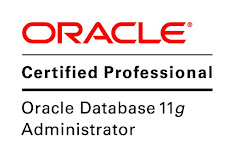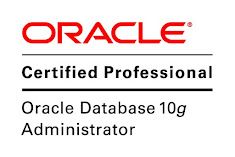Environment:
[oracle@nodett1 sql]$ ttversion TimesTen Release 11.2.2.2.0 (32 bit Linux/x86) (tt1122:53392) 2011-12-23T09:21:34Z Instance admin: oracle Instance home directory: /u01/app/oracle/product/11.2.2/TimesTen/tt1122 Group owner: oinstall Daemon home directory: /u01/app/oracle/product/11.2.2/TimesTen/tt1122/info PL/SQL enabled. [oracle@nodett1 sql]$Let's create a compression table and insert 1M rows.
Command> create table tab_comp (id number not null,
> val_1 varchar2(40),
> val_2 varchar2(40))
> compress (val_1 by dictionary maxvalues = 255) optimized for read;
Command> desc tab_comp;
Table GENA.TAB_COMP:
Columns:
ID NUMBER NOT NULL
VAL_1 VARCHAR2 (40) INLINE
VAL_2 VARCHAR2 (40) INLINE
COMPRESS ( VAL_1 BY DICTIONARY MAXVALUES=255 ) OPTIMIZED FOR READ
1 table found.
(primary key columns are indicated with *)
Command> alltables;
GENA.CD$_1086048_2
GENA.TAB_COMP
...
26 tables found.
Command>
Command> desc CD$_1086048_2;
Table GENA.CD$_1086048_2:
Columns:
*VAL_1 VARCHAR2 (40) INLINE
##CD_REFCNT TT_INTEGER NOT NULL
1 table found.
(primary key columns are indicated with *)
Command>
Command> begin
> for i in 1 .. 1000000 loop
> insert into tab_comp
> values (i,
> '1234567890123456789012345678901234567890',
> '1234567890123456789012345678901234567890');
> end loop;
> end;
> /
PL/SQL procedure successfully completed.
Command> select count(*) from tab_comp;
< 1000000 >
1 row found.
Command> select * from CD$_1086048_2;
< 1234567890123456789012345678901234567890, 1000000 >
1 row found.
Command>
As you can see, I've inserted the same value in VAL_1 column one million times. The CD$_1086048_2 system table contains only one row and TAB_COMP table contains only one 1 byte pointer in VAL_1 column for one row in CD$_1086048_2 table.
After that I execute the following simple query (select count(val_1) from tab_comp;).
Command> autocommit 0; Command> showplan 1; Command> select count(val_1) from tab_comp; Query Optimizer Plan: STEP: 1 LEVEL: 2 OPERATION: TblLkSerialScan TBLNAME: TAB_COMP IXNAME:I was confused!!! TimesTen optimizer has chosen the full TAB_COMP table scan and of course it took long time (~0.04s). In TimesTen documentation I found these sentences ‘You can compress tables at the column level, which stores data more efficiently. This eliminates redundant storage of duplicate values within columns and improves the performance of SQL queries that perform full table scans.’ So I was expecting that optimizer would rewrite the query for something like select count('##CD_REFCNT') from CD$_1086048_2, especially taking into account that all information needed for optimizer could be found in CD$_1086048_2 table.INDEXED CONDITION: NOT INDEXED: STEP: 2 LEVEL: 1 OPERATION: OneGroupGroupBy TBLNAME: IXNAME: INDEXED CONDITION: NOT INDEXED: < 1000000 > 1 row found. Command> Command> showplan 0; Command> timing 1; Command> select count(val_1) from tab_comp; < 1000000 > 1 row found. Execution time (SQLExecute + Fetch Loop) = 0.050841 seconds. Command> select count(val_1) from tab_comp; < 1000000 > 1 row found. Execution time (SQLExecute + Fetch Loop) = 0.054260 seconds. Command> select count(val_1) from tab_comp; < 1000000 > 1 row found. Execution time (SQLExecute + Fetch Loop) = 0.046867 seconds. Command> select count(val_1) from tab_comp; < 1000000 > 1 row found. Execution time (SQLExecute + Fetch Loop) = 0.049661 seconds. Command>
Command> select count('##CD_REFCNT') from CD$_1086048_2;
< 1 >
1 row found.
Execution time (SQLExecute + Fetch Loop) = 0.000058 seconds.
Command> select count('##CD_REFCNT') from CD$_1086048_2;
< 1 >
1 row found.
Execution time (SQLExecute + Fetch Loop) = 0.000081 seconds.
Unfortunately, my assumptions were not confirmed. I hope TimesTen development team will include this feature in next release.








Комментариев нет:
Отправить комментарий